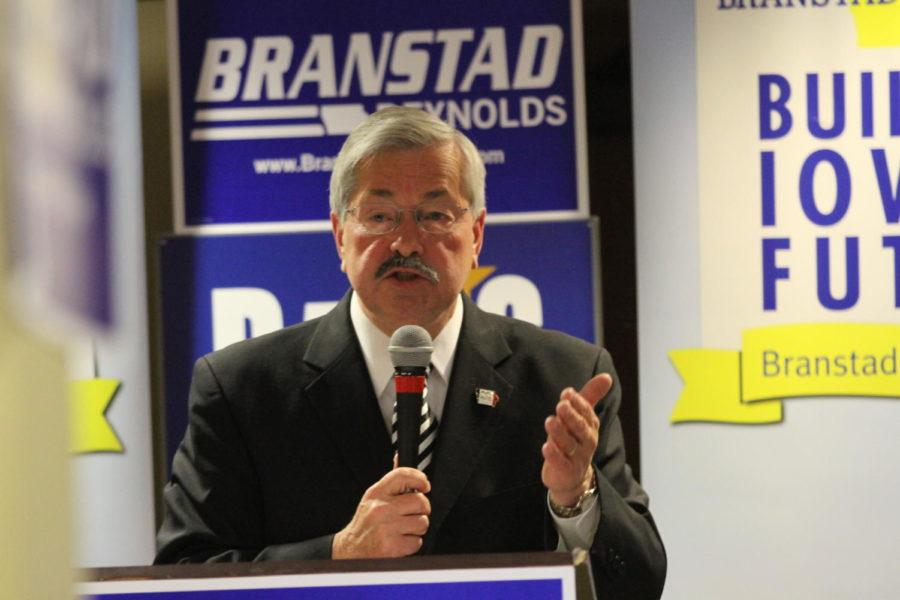Wright: Brandstad’s ambassadorship a glimmer of hope
Tiffany Herring/Iowa State Daily
Gov. Terry Branstad speaks at at an early voting rally at Alpha Gamma Rho on Oct. 11. The Branstad-Reynolds team and other Iowa Republican candidates spoke at the event.
April 27, 2017
In approximately one week, the former Governor of Iowa, Terry Branstad, will most likely be nominated as the next ambassador to China. Electing the governor of a Midwestern state to be ambassador to a superpower with very different policies, cultures and agendas might not seem like an appropriate move. While Branstad may not be a perfect candidate, the validity of choosing him for the post is certainly more nuanced than that.
Rather than having a distinct relationship with China, Governor Branstad has a decades long relationship with China’s president, Xi Jinping. In 1985, Jinping, who was at that time on a committee to learn about modern farming in the United States, visited Iowa to get a personal understanding of U.S. agriculture. He met with Branstad, who holds the record as Iowa’s longest serving governor.
The two have met frequently in recent years, mostly regarding trade issues, where Branstad visited China to talk about exported food from Iowa. This seems to be the crux of the president’s reason for choosing Governor Branstad, as offering someone the Chinese government has publicly called “an old friend” seems like a highly effective olive branch.
So how effective of an ambassador will Governor Branstad be? Branstad, while an early supporter for Donald Trump, has a different approach to the United States’ relations with China. On a particular level, he strongly supported the Trans-Pacific-Partnership, and increasing his state’s level of exports to China.
These are narrow examples of what is not quite opposing views, but certainly a different approach to the nation’s most important trade partner. While Trump has held a hardline stance on trade relations with China, which are central to his nationalistic approach to foreign policy, Branstad is generally in support of the largely neoliberal tendencies of recent decades.
This may ease concerns, not only in Beijing, but also amongst Americans and other eastern countries concerned with the possibility of a fractured relationship between the two countries.
One point to keep in mind with regards to how Governor Branstad’s policies will affect foreign relations, is to keep in mind his role as an agent of the president. If, as an ambassador, Branstad is faced with a choice over maintaining or contracting our trade relationship, he will be more likely to act as directed by the president.
Nonetheless, Branstad is entering U.S.-Sino relations when a major shakeup is occurring between the two worlds. China has for years been pressuring a move towards a new type of bilateral relations between the two countries. The Obama administration seemed concerned about allowing the country to frame the paradigm of U.S. relations.
Earlier this month, secretary of state Rex Tillerson echoed President Jinping, saying that mutual respect and benefit was necessary going forward between the two countries. This, to me, is a glimmer of hope for the future of our country’s foreign policy.
















